Enjoying and praising another's work is always a pleasure. Nothing gives the same lift and thrill as encountering something very good in art. Such was true in Jones Room afternoons when my Stanford fellows, men and women, read. When the work is great and a surprise the elevation can transport you away from all else at hand.
So I'm very glad to present brief Appreciations of the writer Muhammad Iqbal, the photographer Vivian Maier, Paul Fussell's book The Great War and Modern Memory, and the painter Candido Portinari.
One night during the 2019 JazzFest in New Orleans I happened to hang out with a well-known writer and singer in the pre-performance green-room of a French Quarter venue. When he left to go on-stage I wrote out three subjects that I thought might interest him--poetry by Muhammad Iqbal, photography by Vivian Maier, and Paul Fussell's book.
This past month, June, Maryse and I were in San Diego for her to again attend the National Federation of Community Broadcasters' conference. Another welcome chance got us invited to a baseball game. Radio-station KDNK of the Roaring Fork Valley in Colorado and its Manager Gavin Dahl organized a van-full of community broadcasters for the San Diego Padres' game against the Milwuakee Brewers.
Baseball was one passion of my sports-nuts youth. Summertimes as Junior-High-age aspirants to the Major Leagues, we stood like so many craning Young Crows on a Doug Fir branch beside the 1st-Base line of Civic Field in Bellingham, Washington, watching our home-team Bells play the Fairbanks Goldpanners and the Anchorage Bucs. Future All-Stars Tom Seaver and Reggie Jackson and Bob Boone, then Collegians, played with diving abandon in those series.
So I thought of how much of “tree-mendous” excellence may remain obscure even in our media-saturated West. I thought of some who have touched me. A first version of this Appreciation came out on the WeAreRevolutions website in its Flipping the Script blog.
Poetry by Muhammad Iqbal
Muhammad Iqbal (1877--1938) is a poet, scientist and statesman. He's among the most revered figures of Pakistan. Colleges and a Major Airport are named for him. He studied at the Universities of Cambridge, England, and Munich, Germany. He wrote: 'I confess I owe a great deal to Hegel, Goethe, Mirza Ghalib,
Mirza Abdul Qadir Bedil and Wordsworth. The first two led me into the “inside” of things; the third and fourth taught me how to remain oriental in spirit and expression after having assimilated foreign ideals of poetry, and the last saved me from atheism in my student days.'
The treasure-trove of Iqbal's writings online is http://www.allamaiqbal.com.
He published volumes of poems and essays over the last three decades of his life. Several of his major poems are in his native Urdu--from the northern Indian/Pakistani Subcontinent--and several are in Persian Farsi. He strove to unite Muslims through a revival of historical ideals applied to 20th-century predicaments. His poetry soars and surprises like that of Sufi mystics he admires and yet it's also grounded in the rigorousness of one who respects the mathematics behind the physics of Relativity and the nuts-and-bolts of negotiating a practicable Islamic nation.
I came to Iqbal through communicating with longtime friend Ustad Shafqat Ali Khan about how he and I might collaborate in poetry and song. Shafqat descends from a family that has performed for their society over four centuries. They maintain and expand the Sham Chaurasia tradition. Their ancestors sang in the court of the third Mughal emperor, Akbar. Shafqat's father, Ustad Salamat Ali Khan, is the focal voice in Satyajit Ray's film "The Music Room." Shafqat and his father and I met in San Francisco in 1994 through Glenn and Shantee Baker Spearman; we immediately began to imagine what we could create together; I then produced the Urna album Journey To The Beloved with father and son and guitarist Dhyani Dharma and tenor-saxophonist Glenn Spearman as the album's principals. Urna is an Urdu word for flight. Suggestions from Shafqat led me to Mohammad Iqbal. Please check out Shafqat in this ghazal from one of his much-watched performances on youtube; he's become a singer who's moving like his father.
Muhammad Iqbal published more than 12 books between 1915 and his passing. His prose considers modern and ancient pathways: the example of Mohammad's prophecy as an ideal, philosophies of Bergson and Nietzsche, science of the Curies and Relativity, and the ravaging contests of Colonialism that culminated in World War I. Iqbal steadily states alternatives in spirituality of which the ancient East reminds us.
Iqbal's 1922 Message from the East in the Persian Farsi (Payam-i-Mashriq) responds to Goethe's 1819 East-West Divan and the German writers's dialogue there with Hafiz, the transcendent Sufi poet of 14th-century Persia.
Iqbal wrote about his Message: 'The reader will himself see that its main object is to bring out those social, moral and religious truths which have a bearing on the spiritual development of individuals and communities.... The Eastern people have, however, realized that life cannot effect a revolution in its environment before it has had, in the first instance, a revolution in the inner depths of its own being, nor can a new world assume external form until its existence takes shape in the hearts of men. That immutable law of the Universe which the Quran has enunciated in the simple but comprehensive verse: "God does not change the destiny of people unless they change themselves." ' Iqbal hits home again!
Iqbal's 1924 book of poems in Urdu Call of the Caravan Bell and his 1932 book of poems in Farsi The Song of Eternity (his companion here Rumi as Dante's companion was Virgil in The Divine Comedy) recur to the need to find or regain a charitable, honorable and stable self, so that a society of such quality may ensue.
Here are two quatrains that speak from Iqbal's profundity and his musicality, I think.
'Of love and losing what words need be said?
The self’s unfolding is Life’s fountain-head;
There’s neither loss to ocean nor to pearl
In the pearl’s loosening from the ocean’s bed.'
Translated by: V.G. Kiernan
'Why is there no storm in your sea?
Why is your khudi not Muslim?
It is pointless to complain of God’s decree –
Why are you not God’s decree?'
Translated by: Mustansir Mir
Iqbal and Shafqat's life as a traveling performer inspired my 'What Is There in This Airport Sings?' Iqbal then became the main guide for one of four leading characters, the Afghan Ahmed, a former Mujahideen, in my play "We Are Rainbows Dancing Before Mountains Explode". Iqbal's wisdom enables Ahmed to accept as a higher truth the love he has with DurgaKali, a Hindu from Bhopal. Iqbal is joined with the play's aim of reconciling Pakistan and India. Iqbal is also the direct source for two more poems that I recorded with a musician whose own greatness and sense of humor befit Iqbal, Hamid Drake, 'Poet, Help My Heart' and 'Poet and Philosopher, Help My Heart.'
Sir Muhammad Allama Iqbal enjoys a laugh.
Iqbal is to me like the Himalayas of his native Kashmir. These massive and unveiling mountains were particular subjects for him in youth. Iqbaloffers bridges for joining Islam with other faiths and for connecting the so-called East and so-called West. The documentary below is a journey through Iqbal's life and thought.
Photography by Vivian Maier
Vivian's Maier's story (1926-2009) is one for 19th-century novelists such as Balzac Hugo. It's a miracle of self-willed obscurity became celebrated acclaim. The immigrant from France Vivian worked as a nanny over 40 years, tending to children on Chicago's North Shore and elsewhere in the Upper Midwest. She talked seldom about her pre-World War II origins in Alsatia. She never talked about photography. She did insist: "I must have a lock for my room." On days off she left her workplace house with a camera harnessed to her. By the 1990s she'd accumulated 100,000 negatives and stored them in boxes from domicile to domicile.
A highly unusual person. An obsessively driven person. A person whose life centered on a passion that cost her thousands of dollars and offered her—by her own choice—no prospect of material gain.
An artist.
The 2014 documentary by Vivian’s primary discoverer, John Maloof, revealed Maier to Maryse and me. As with Iqbal and as with Walker Evans and the painters we'll see below, Candido Portinari of Brasil and Lucy Tejada of Colombia, range and humanity distinguish Maier's work.
An innate and resolute outsider, she catches essences of society and personality.
She's bold and intent as a hawk. That she herself is outsider lends her sympathy for the poor and distressed.
She may long for connections that life and her choices deny her.
Vivian Maier's photos are short-stories. They offer new insights and feelings each time you look
.
Paul Fussell's The Great War and Modern Memory
Paul Fussell published his ... Great War and Modern Memory in 1975. He was then a Professor at Rutgers University in New Jersey, nearby Newark and Staten Island.
His book combines the experiences and expressions of famous British writers with those of unknown infantrymen in World War I. It mixes poetry and letters. It quotes poets--Edmund Blunden, Rupert Brooke, Robert Graves, Wilfred Owen, Siegfried Sassoon, ... --alongside excerpts from notes home by relatively unlettered soldiers whose loyalties toward their Home and Country and their fellows are differently eloquent but similarly poignant. Mass tragedy and futility become the daily fodder of the trenches and the years.
Fussell writes that ’there seems to be one dominating form of modern understanding; that it is essentially ironic; and that it originates largely in the application of mind and memory to the events of the Great War.’
Joseph Heller, author of Catch-22 and the even greater (I think) Something Happened, called Fussell's book 'the best book I know of about World War One.'
Candido Portinari, Painter
The two images above are from a prodigious gallery of work by Candido Portinari, 'Projeto Portinari', that resides online.
Here’s how I encountered Portinari. July 1982, I was flying from San Francisco by way of Los Angeles and on to Rio de Janeiro to compere in the Maratona there. Varig Airlines in-flight magazine featured one article, with sumptuous photos, that gratified me: ‘Mulatta / Flower of Miscegenation.’ A second piece was even more resplendant. It splashed effervescent azures and cornsilk yellows and earthen-clay reds across pages as the plane from L. A.crossed above the Amazon toward Rio de Janeiro. I carried the warmest of Romantic expectations to Brasil, a beacon to me since I was eight years old and transported from Whatcom County by a red Hammond Atlas. Candido Portinari's paintings pleased me like an unexpected but desired gift. I was coming to Rio to run, thanks José and the Jornal do Brasil and an appearance-fee, and here was art--in an Airlines' magazine!--of a brightness and majesty and inventiveness comparable to feathers in "Black Orpheus"!
I thought, too: Why is this painter not famous in North America like, say, peers such as Willrm de Kooning and Helen Frankenthaler?
Later I learned more. Portinari’s decades of work consistently revealed wonders of empathy and imagination. The boy was born among poverty on a coffee plantation in 1903. The man died from paints' poisoning in 1962, amid veneration and still flowering creativity. He stayed true to sentiments that first animated his art: lways one with those who work the hardest and the least. Their struggling and stoicism were his and so were their pleasures and joys.
Portinari's sympathies never left workers in the highlands-and-plantation town of Brodowski.
Portinari's international ascent was swift. Rene Huygens', Director of the Louvre in Paris, greeted the Brasilian in 1937. 'I consider Portinari one of the greatest painters of our time. His strength is enormous.' Jean Cassou of Paris' Museum of Modern Art said: 'Portinari is, without a doubt, the greatest painter in Latin American and one of the greatest contemporary painters.' The United States' Poet Laureate in 1942, Archibald MacLeish, invited Portinari to contribute four murals to the Library of Congress.
The painter was lauded in Argentina and Uruguay during their 'ferment' in the latter 1940s. He'd had to flee Brasil after running for Senate as a Communist.
Candido Portinari died in early 1962 at age 59 . He'd refused doctors' advice to back off from painting.
He was beloved from his 20s onward in Brasil--as the Varig Airlines' piece of 1982 manifested--but his public presence diminished during the Military Dictatorship that started with a coup in 1964 and lasted for 23 years. His son Joao Candido Portinari, a Doctor of Engineering at the Massachusetts Institute of Technology, led an effort to catalogue thousands of pieces.
Now, more than 3500 of Candido's paintings available on view online through Projeto Portinari.
Also, Google--whatever one may think of Google as an absurdly dead-ended and robotic ‘transhumanist’ engine and vehicle--has provided its 'Arts & Culture' resources as a platform for the art and life of Candido Portinari.
Freedom and compassion made him, as it their combination enabled the careers of Mohammad Iqbal and Vivian Maier and Paul Fussell’s great book of expressions from those sacrificed in the first of World Wars. May we be moved away from WEF-Dumb by their examples!








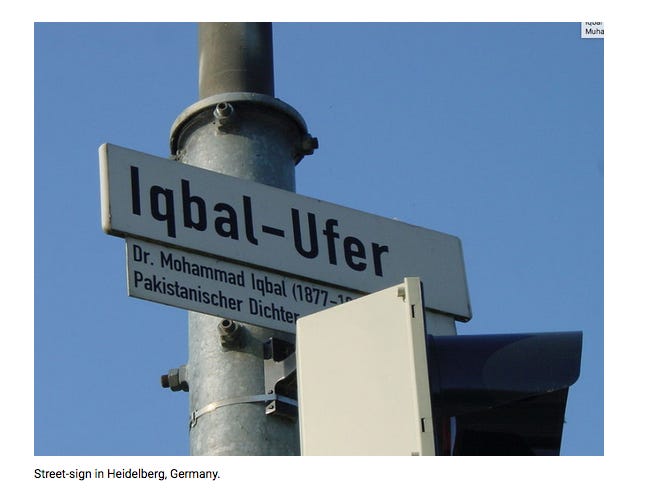


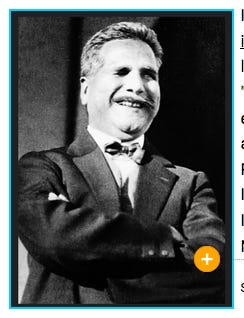



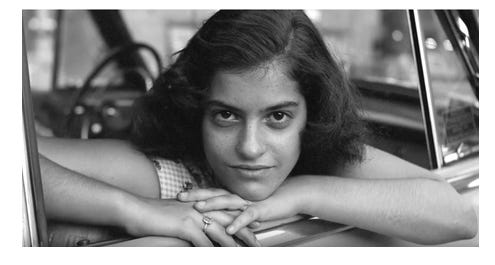


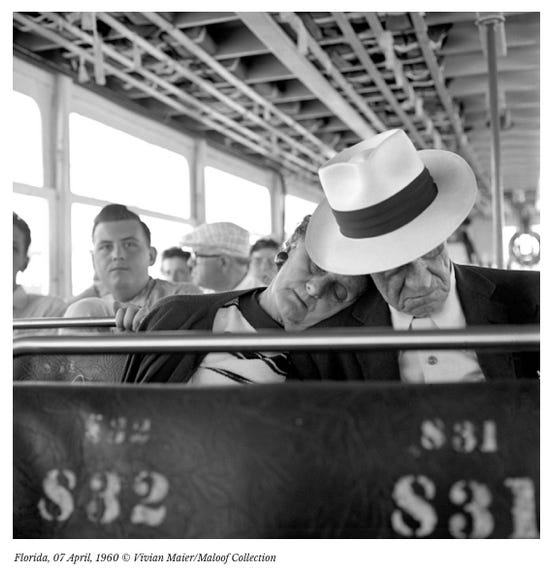

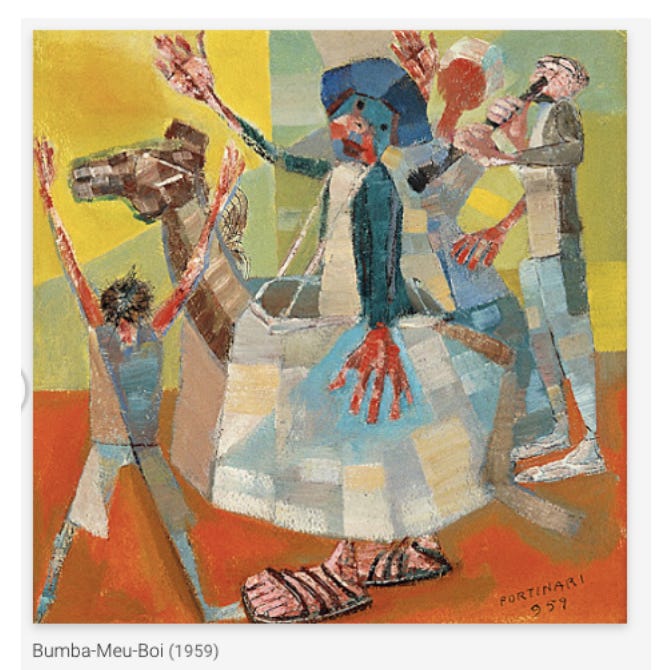
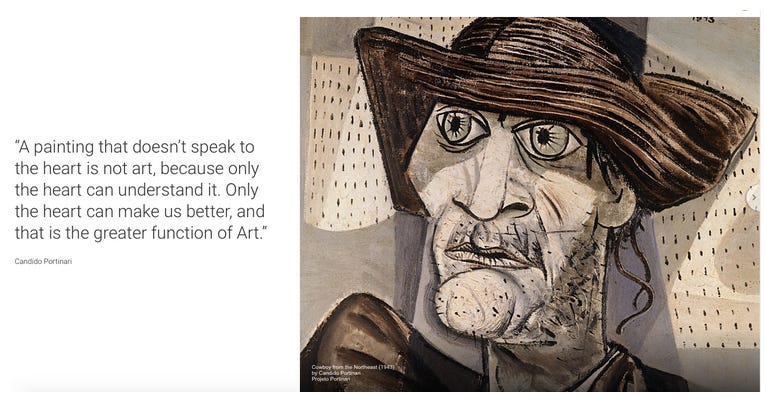




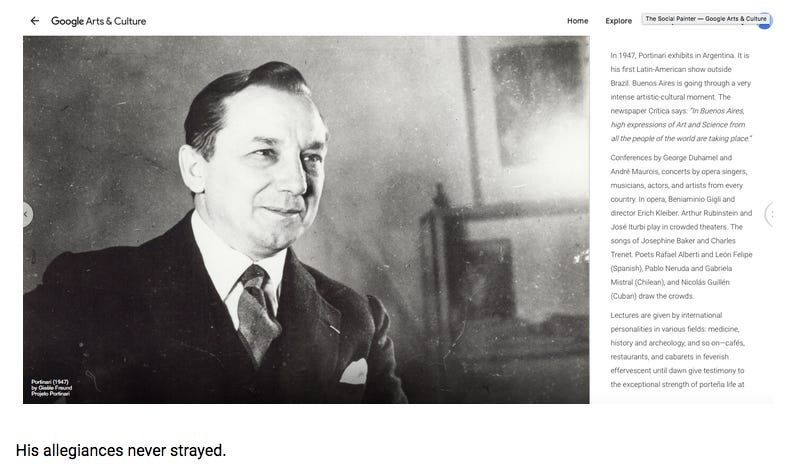



You're more welcome, Andy! Art (or "Ort", as Henry and friends said in 1930s' Paris) is a freedom we all deserve--and it's a freedom that the WEF-crats would remove.
Thanks DP!